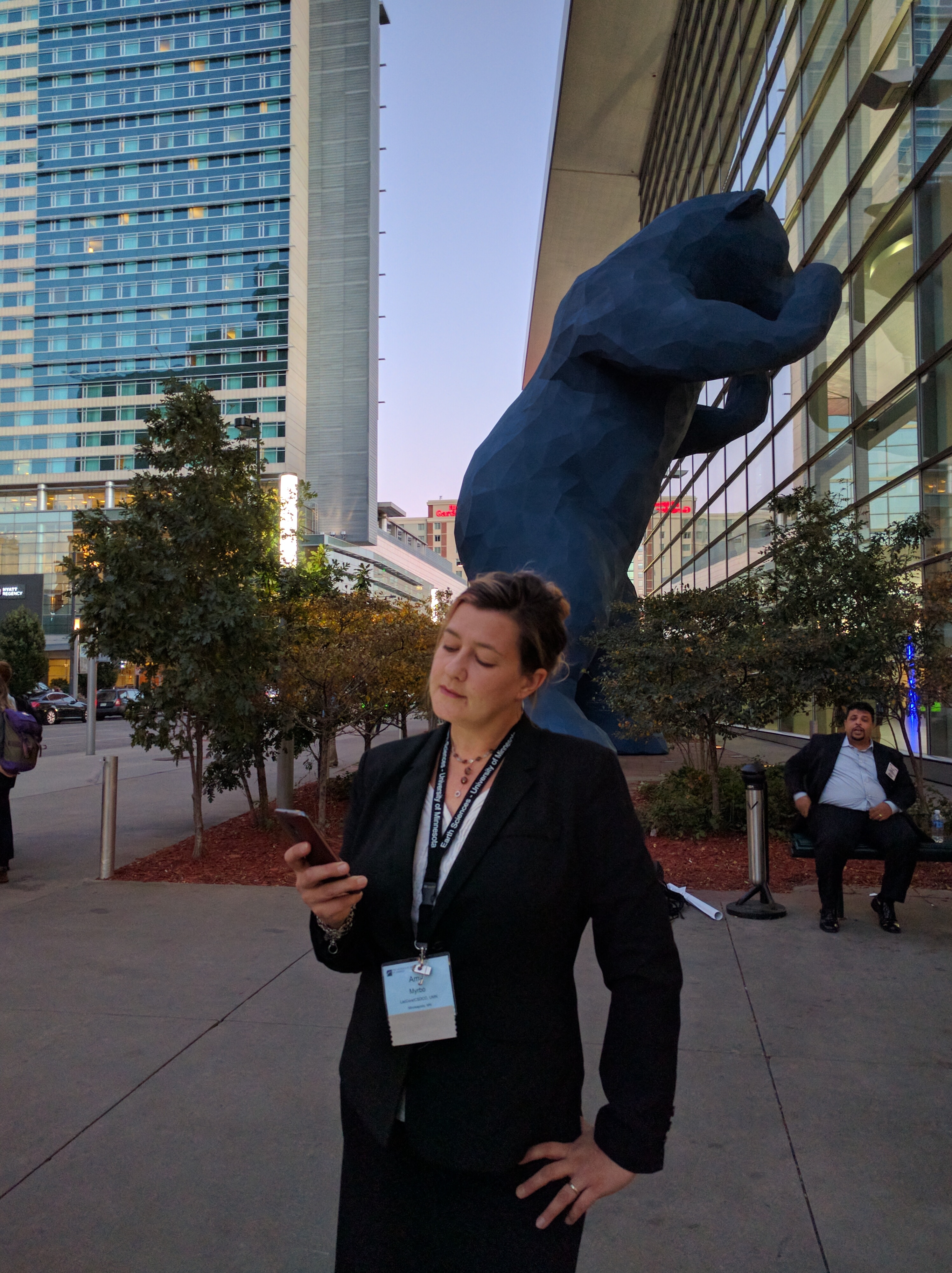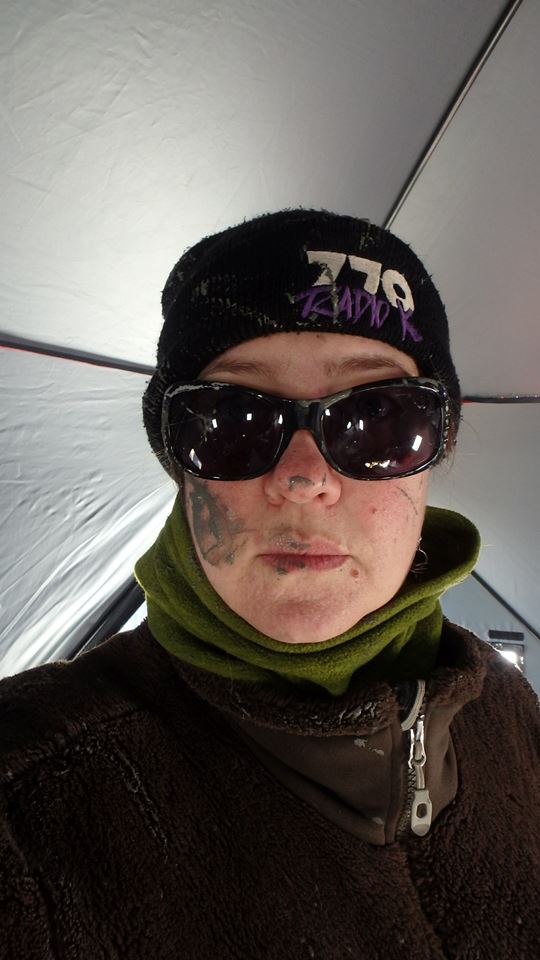Amy Myrbo
 Amy Myrbo, Ph.D., is a lake sediment researcher specializing in biogeochemistry and sedimentology. She is a Research Associate and Director of Outreach, Diversity, and Education at LacCore, the National Lacustrine Core Facility, in the Department of Earth Sciences at the University of Minnesota. Her dissertation research examined the carbon cycle in carbonate-producing lakes, and the paleorecord of human impacts to urban lakes. She is also interested in radiocarbon dating, calibration, and generation of age-depth models, and has worked collaboratively with Native American Tribal resource managers looking at the histories of lakes on reservations and lands governed by treaties. She is finishing a large project on the biogeochemistry of sulfur in shallow lakes and wetlands in Minnesota, and the effects on wild rice, nutrients, and mercury cycling.
Amy Myrbo, Ph.D., is a lake sediment researcher specializing in biogeochemistry and sedimentology. She is a Research Associate and Director of Outreach, Diversity, and Education at LacCore, the National Lacustrine Core Facility, in the Department of Earth Sciences at the University of Minnesota. Her dissertation research examined the carbon cycle in carbonate-producing lakes, and the paleorecord of human impacts to urban lakes. She is also interested in radiocarbon dating, calibration, and generation of age-depth models, and has worked collaboratively with Native American Tribal resource managers looking at the histories of lakes on reservations and lands governed by treaties. She is finishing a large project on the biogeochemistry of sulfur in shallow lakes and wetlands in Minnesota, and the effects on wild rice, nutrients, and mercury cycling.
Through her work with Native American researchers and students, Amy became involved in communities dedicated to broadening participation of groups underrepresented in the geosciences. A few years ago, Amy had the opportunity to write a new 50% position into one of her NSF grants to be Director of Outreach, Diversity, and Education. Amy is now able to devote substantial time to this incredibly satisfying and fun position. Amy finds that there is an enormous amount of work to do. It’s a great time to be doing diversity work, and it is increasingly rewarded by NSF and other funding agencies.
While acknowledging that funding rates are low due to limited Federal allocations, and the fact that it is highly competitive, Amy is a huge fan of the National Science Foundation. She highly recommends getting acquainted with program officers, getting involved in reviewing proposals, and serving on panels. Amy found serving on Graduate Research Fellowship Program (GRFP) panels to be “an incredible and eye-opening experience.”
 Amy has spent the past 14 years at LacCore, the National Lacustrine Core Facility, which was joined with CSDCO, the Continental Scientific Drilling Coordination Office. She has had the opportunity to meet hundreds of visiting students and other researchers from all over the world and to go coring in lakes all over the world. She particularly enjoyed (and is trying to specialize in) working in Mexico and Central and South America. Her other focus at LacCore/CSDCO is in coadvising undergraduate researchers (REUs, Keck projects) and training undergraduate and graduate students in core collection, analysis, and everything that goes with it. Amy teaches a two-week Drilling and Coring Summer Institute for grad students, postdocs, and early career researchers during the summer. It gives her acute imposter syndrome to lecture to these accomplished early career scientists because of the feeling that some of them know more than she does about some subjects she discusses, but it has been “quite an amazing experience.” For the 2016 application review, Amy hid the columns with the applicants’ names and institutions, and only read their short essay questions and was pleased to see that 2/3 of the successful applicants were women! One of the two sessions in 2016 was 13 women and two men, and had a great supportive atmosphere.
Amy has spent the past 14 years at LacCore, the National Lacustrine Core Facility, which was joined with CSDCO, the Continental Scientific Drilling Coordination Office. She has had the opportunity to meet hundreds of visiting students and other researchers from all over the world and to go coring in lakes all over the world. She particularly enjoyed (and is trying to specialize in) working in Mexico and Central and South America. Her other focus at LacCore/CSDCO is in coadvising undergraduate researchers (REUs, Keck projects) and training undergraduate and graduate students in core collection, analysis, and everything that goes with it. Amy teaches a two-week Drilling and Coring Summer Institute for grad students, postdocs, and early career researchers during the summer. It gives her acute imposter syndrome to lecture to these accomplished early career scientists because of the feeling that some of them know more than she does about some subjects she discusses, but it has been “quite an amazing experience.” For the 2016 application review, Amy hid the columns with the applicants’ names and institutions, and only read their short essay questions and was pleased to see that 2/3 of the successful applicants were women! One of the two sessions in 2016 was 13 women and two men, and had a great supportive atmosphere.
Amy has been involved in the popular Flyover Country mobile app for geoscience (fc.umn.edu – available for iOS and Android), which is funded by NSF. Working on Flyover Country has drawn her into the Geoinformatics community. She finds it exciting because of all the work being done to connect big databases and build cool tools, and intimidating because she does not identify as a coder. Amy explains that there are lots of great ways to get involved that don’t require a computer science background, and “we need people who have both Earth science and computer science expertise.” She recommends looking into the NSF EarthCube community and the fascinating work happening at the intersection of informatics and every geoscience discipline.
Since visiting ESWN Leadership Board Member Erika Marín-Spiotta’s office a couple years ago, Amy has been distributing ESWN brochures at the LacCore/CSDCO booth at GSA, AGU, and other meetings. She always recommends ESWN to undergrad interns and workshop participants. She had quite a lively discussion through ESWN a few years ago about peeing in the field, which she is an expert on. ESWN is a daily source of information and inspiration for Amy. She finds that the active Facebook page is a great way to keep up with new articles, studies, and important discussions. Some of these are right in her wheelhouse – especially those regarding intersectionality between women in science and broadening participation of other groups including racial and ethnic minorities, LGBTQIA+, persons with disabilities, veterans and active military personnel, first-generation college students, and others – and some, like teaching and tenure discussions, are not directly relevant to her but she finds them interesting and important to keep up with. She is also happy to see how much discussion there is in ESWN about mental health issues. She believes that “destigmatizing depression, anxiety, etc., is one of our most important challenges in helping all scientists and academics be happier and healthier people.”
Amy grew up in the heart of the urban area between the Twin Cities of Minneapolis and St. Paul. She dropped out of high school halfway through 11th grade, and never got a GED. Her BA from the University of Minnesota is in English Literature, and she was converted to Earth Science when she took a Historical Geology course to fulfill an undergrad science requirement. She jumped right into the Geology Ph.D. program at UMN, and eventually finished. She rides her bike to work year-round and she is married to a musician. Her favorite pastimes are gardening and reading fiction and poetry. Her favorite book is probably Infinite Jest by David Foster Wallace, and her favorite poet is Gerard Manley Hopkins. She also loves Sylvia Plath, Alice Munro, Margaret Atwood, Irvine Welsh, Sherman Alexie, Flannery O’Connor, John Steinbeck, Shakespeare, and Chaucer. Her advice is to “Get out there, get involved, be brave, fight the good fight, and talk to as many people as you can.”
